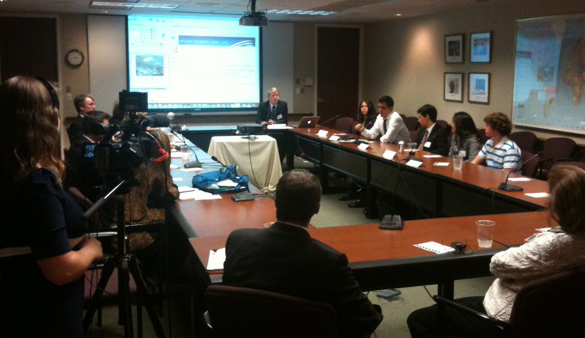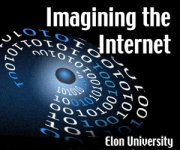Posts Tagged ‘teens’
IGF-USA young people’s panel: GenNext’s Online Future

This 2009 IGF-USA session description: “Young Internet users, entrepreneurs and advocates are the expert respondents in this session which is aimed at illuminating current and future issues. Discussion points will include the positives and negatives of hyperconnectivity, online security/safety, copyright, the future of the media and information, and the future of identity and privacy.”
Nathaniel James, executive director for OneWebDay was the panel moderator. Participants on the panel included Sebastian Bernal, a student in the School of International Service at American University; Aaron Eilbott, a sophomore at Yorktown High School in Arlington, Va.; Randy Gyllenhaal, and Alex Trice, both from Elon University’s School of Communications; and Kim Ngyuyen, consumer privacy fellow at the Electronic Privacy Information Center (EPIC).
How they use the Internet
The panelists started out by describing their personal use of the Internet and online tools. Aaron Eilbott, age 14, noted he has more than 300 Facebook friends and at any moment at least 100 of them are online. Randy Gyllenhaal spoke with enthusiasm about his Blackberry. “There’s a reason they call them Crackberries,” he said as he noted that he is checking it all the time.
Moderator Nathan James, director of OneWebDay, asked the young panelists to share stories about how they work online. Eilbott said he keeps Facebook on when he does homework every day. “One day last week it went completely offline and I felt deserted,” he said. “I had to do my homework by myself. I didn’t realize I was kind of addicted to it until I didn’t have it.”
Kim Ngyuyen, a consumer privacy fellow for EPIC in her mid-20s said that she disagrees with older adults that the Internet is a distraction for young people.
It is actually more distracting when the Internet is down because you keep clicking on it and checking and checking when it’s gone. You are trying to do everything you can to get that Internet back. It’s a security blanket. You always need to feel connected. – Kim Ngyuyen
She also spoke about being online while in class at her university. “It’s not a distraction there. When you are called on in classes, friends might ‘chat’ you answers to help you if you have trouble answering a professor’s question,” she said, adding with a smile, “I’m not saying all of the conversations are academic, you know.” The room filled with laughter.
Being hyperconnected, now and in the future
Discussant Stephen Balkam, director of the Family Online Safety Institute, brought up a current BBC report titled “Tech Addiction Harms Learning.” It noted that 63 percent of the students surveyed indicated that they are addicted to Internet. “Obviously this was written by adults with a different point of view,” he told the panelists, noting that it might be a slanted perspective. “The world you guys are going to inherit is an interconnected world… Whether we like it or not we are going to a world where there is this constant need and desire to be connected.”
Panelist Alex Trice, 19, agreed. “I had to do an assignment for class where I had to go through a whole day without being connected to media, and I was constantly thinking about it… For our generation, being connected is important.”
Sebastian Bernal, a freshman from American University, noted that the hyperconnectedness we have now is “just foreshadowing what we will have in the future.”
Discussant Balkam noted that some people anticipate that brain implants of information devices may be only five years away. “When your kids come to you and ask for a brain implant,” he asked rhetorically, “what are you going to do about that?”
Young people tough on right age for starting on the ‘net
The group of young people began to discuss the appropriate age to begin going online. Trice said she started using the Internet at age 7, researching dinosaurs, fairies and unicorns. “I would say don’t get an e-mail address and Facebook until you are 13,” she said.
Randy Gyllenhaal, a senior at Elon University, said he read a report that 11 is the average age of a child encountering a porn site. “There are certain things in the digital world like pornography that worry me,” he said. “They should be exposed to the Internet, but don’t become addicted to it until you are rational about it like we are.”
Bernal said 13 is the age he would suggest to delineate as the divider before a child goes online. “If a 2-year-old or 4-year-old is online all the time, he won’t be able to develop social skills.” Ngyuyen said she suggests children should not go online before the age of 13. “The risk of stumbling upon pornography or something that is harmful to children is higher every year,” she said. “The Internet poses a specific danger to younger children. It is up to parents to make sure their children are using the Internet the right way.”
Eilbott declined to set a particular age for starting on the Internet. “I wouldn’t want to expose my children to the Internet until they have a reason to use it for educational purposes,” he said.
Privacy as an opt-in choice
The topic of online privacy was introduced by the moderator. “We don’t have to give up our privacy,” Ngyuyen said. “Users have to have control over their information. You should have a choice. EPIC favors an opt-in approach not opt-out. So you should start with no information available about you and then have to opt-in to allowing it to be shared.”
Eilbott said he generally knows the people who are seeing information about him on social networks. “I have met 90 to 95 percent of the people who are my friends on Facebook,” he said.
On Facebook, it’s not about being friends with them as it is with friends in real life. On Facebook, the definition of a friend is anyone you have met in your life for at least two seconds. – Aaron Eilbott
How young people get their information
The panel began discussing how they get information. “I am probably the only person in my age group who watches network news,” he said, adding that he thinks the “flattening world of media” – in regard to so many unreliable sources getting into the mix, with some being considered to be producing ‘news’ – is dangerous. “I think most people still trust CNN, the Associated Press the New York Times, and I feel the mainstream media has been flattened to include bloggers.
“It is important to have professional and verifiable journalists doing work and Twitter and those tools will help spread that information out to those who are not looking at traditional news.”
Trice noted that she gets news through her social networks. “I find out a lot of news on Facebook and on Twitter rather than watching television, I find it all out on the Internet,” she noted, and she added, “We all know how to use the technology and it gives us more power as individuals. We can share what we see from our perspectives from all over the world. Rather than just the mainstream media you can see news as a person sees it from an eyewitness viewpoint.”
A member of the audience, Derrick Cogburn of American University, asked the panelists what techniques they have developed or adopted “to vet the information that’s coming at you so fast today. How do you know that Michael Jackson died?” Trice told a story about being out with friends one night when she got a text message that Matt Damon had died. She and her friends began texting other people to ask if it was true and didn’t hear any verification. Next, they checked the LA Times. “We didn’t see anything from a source we trusted,” she said, “so we didn’t believe he died.”
Copyright and IP gets audience going
The moderator brought up the topic of intellectual property and copyright. “Think about the people you know and how they are using content,” James said. “Tell us from your perspective in a world where information flows so quickly it is simpler to get it without paying. Where is the intellectual property debate going?”
Eilbott said teens are aware of copyright but they don’t care about it. “We are aware of what can happen if you are caught, but there’s not much fear of any legal consequences,” he said. “The fee if you get caught is so high that it seems almost mythical – $80,000 if you download one song, yeah right. ”
Trice observed that hackers who enable illegal downloaders always seem to find a way around any barriers raised to deter them.
No matter how many ways they try to make people pay, they are going to find ways to circumvent it and find ways to hack into it and get it free. – Alex Trice
Susan Anthony from the U.S. Patent and Trademark Office was among many audience members with a keen interest and questions tied to this topic. “If it’s my ox you’re goring I care, if it isn’t, I don’t,” she noted. “In the United States we talk about the university age as the ‘lost generation’ in regard to respecting other people’s copyrights. We have an ongoing debate over how early you should start teaching children about copyright. Some say in elementary school, but I don’t know how I think about that.”
Gyllenhaal jumped into the discussion. “I agree with you completely,” he said. “I think it comes down to the moral issue that you are taking someone else’s work. Personally, a song means more to me if I pay for it. It’s the principle of it – you are taking something that’s not yours. From the moral level of it, if more people treated the Internet that way we’d be better off.”
Several of the young people on the panel agreed that they would pay a flat rate to cover all downloads of copyright-protected content, such as $5 per month paid to their ISP.
Anonymity is valued by young people
When asked by an audience member about anonymity, all of the panelists said they have an anonymous e-mail account. “I call it my spam e-mail account,” Gyllenhaal said. “I don’t have a secret life. It is my Yahoo account. I send my Facebook stuff there and anytime I have to register for a site I use it to avoid spam.”
Ngyuyen also said she uses an extra e-mail address for dealing with spam. “I also use it when I want to make comments on blogs and I want to stay anonymous,” she said. “In general, I do think people have the right to be anonymous online. It would create a chilling effect to lose that right.”
Gyllenhaal brought up Juicy Campus, a currently defunct site on which all posts were anonymous and people were being subjected to bullying and hate speech. And online bullying was briefly discussed.
What are adults all wrong about?
A member of the audience asked, “When you hear adults talk about these ‘universal truths’ about young people online, are any of them really true?”
My parents assume that just because I am on the Internet while I’m doing homework I’m not getting anything done. They don’t give us enough credit for the fact that we are able to multitask. – Alex Trice
Ngyuyen also said her ability to work on other tasks while online was misunderstood. “My parents had the misconception that the Internet is really an entertainment world when in fact I would say having fun on the Internet is maybe 30 percent. I am learning something.”
Eilbott admitted some distraction, noting his parents “do have a point, I will get home from school, start my homework and an hour later not have done anything but talk to 12 friends.”
-Janna Anderson, http://www.imaginingtheinternet.org
